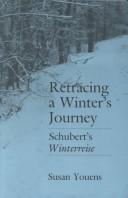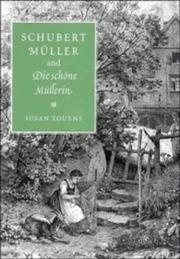| Listing 1 - 5 of 5 |
Sort by
|

ISBN: 0801425999 0801499666 1322504644 0801468280 0801468272 9780801468285 9780801499661 9780801425998 9780801499661 Year: 2013 Publisher: Ithaca, NY
Abstract | Keywords | Export | Availability | Bookmark
 Loading...
Loading...Choose an application
- Reference Manager
- EndNote
- RefWorks (Direct export to RefWorks)
I like these songs better than all the rest, and someday you will too, Franz Schubert told the friends who were the first to hear his song cycle, Winterreise. These lieder have always found admiring audiences, but the poetry he chose to set them to has been widely regarded as weak and trivial. In Retracing a Winter's Journey, Susan Youens looks not only at Schubert's music but at the poetry, drawn from the works of Wilhelm Müller, who once wrote in his diary, "perhaps there is a kindred spirit somewhere who will hear the tunes behind the words and give them back to me!"Youens maintains that Müller, in depicting the wanderings of the alienated lover, produced poetry that was simple but not simple-minded, poetry that embraced simplicity as part of its meaning. In her view, Müller used the ruder folk forms to give his verse greater immediacy, to convey more powerfully the wanderer's complex inner state. Youens addresses many different aspects of Winterreise: the cultural milieu to which it belonged, the genesis of both the poetry and the music, Schubert's transformation of poetic cycle into music, the philosophical dimension of the work, and its musical structure.
Music, Dance, Drama & Film --- Music Instruction & Study --- Schubert, Franz, --- MUSIC / History & Criticism.

ISBN: 052165159X 0521027195 1107117127 0511173350 0511152418 0511327501 0511481977 1280420588 051104805X 9780511481970 0511019262 9780511019265 051103282X 9780511032820 9780511152412 9780521651592 9786610420582 6610420580 9780511048050 Year: 2000 Publisher: Cambridge New York Cambridge University Press
Abstract | Keywords | Export | Availability | Bookmark
 Loading...
Loading...Choose an application
- Reference Manager
- EndNote
- RefWorks (Direct export to RefWorks)
Viennese composer Hugo Wolf produced one of the most important song collections of the nineteenth century when he set to music fifty-three poems by the great German poet Eduard Mörike. Susan Youens reappraises this singular collaboration to shed new light on the sophisticated interplay between poetry and music in the songs. Wolf is customarily described as 'the Poet's Composer', someone who revered poetry and served it faithfully in his music. Yet, as Youens reveals, this cliché overlooks the rich terrain in which his songs are often at cross purposes with his chosen poetry. Although Wolf did much to draw the world's attention to the neglected Swabian poet, his musical interpretation of the poetry was also influenced by his own life, psychology and experiences. This book examines selected Mörike songs in detail, demonstrating that the poems and music each have their own distinctive stories which at times intersect but also diverge.
Mörike, Eduard Friedrich, --- Wolf, Hugo, --- Musical settings --- History and criticism. --- Mörike, Eduard, --- Mërike, Ė., --- Molike, Aidehua, --- Möricke, Eduard, --- Wolf, Hugo --- Mörike, Eduard, Friedrich --- History and criticism --- Duitsland --- 19e eeuw --- Liederen --- Morike, Eduard,
Book
ISBN: 0691091455 Year: 1992 Publisher: Princeton : Princeton University Press,
Abstract | Keywords | Export | Availability | Bookmark
 Loading...
Loading...Choose an application
- Reference Manager
- EndNote
- RefWorks (Direct export to RefWorks)
Vocal music --- -Music --- History and criticism --- Wolf, Hugo --- -History and criticism --- Music --- Wolf, Hugo, --- History and criticism. --- 19th century

ISBN: 9780521823746 Year: 2007 Publisher: Cambridge : Cambridge university press,
Abstract | Keywords | Export | Availability | Bookmark
 Loading...
Loading...Choose an application
- Reference Manager
- EndNote
- RefWorks (Direct export to RefWorks)
Music and literature --- Songs, German --- Songs, German --- History --- History and criticism. --- Texts.

ISBN: 052156364X Year: 1997 Publisher: Cambridge Cambridge University Press
Abstract | Keywords | Export | Availability | Bookmark
 Loading...
Loading...Choose an application
- Reference Manager
- EndNote
- RefWorks (Direct export to RefWorks)
The collaboration of Schubert and the poet Wilhelm Mller produced some of the best loved of nineteenth-century lieder - in particular the song cycle Die schne Mllerin. Professor Youens shows us how this archetypal tale of love and rejection, which has its origins in medieval romance, Minnesong and popular German legend, is reflected in the poet's own experience, the realms of art and life intertwining. Professor Youens considers other poets' explorations of the theme of a miller maid and her suitors, and looks at other musical settings of Mller's mill poems. But above all she examines Mller's permutation of the literary legends as an exploration of erotic obsession, delusion, frenzy, disillusionment and death and the way in which Schubert crucially altered Mller's vision when the poetic cycle became a musical text.
Müller, Wilhelm --- Schubert, Franz --- Müller, Wilhelm, --- Schubert, Franz,
| Listing 1 - 5 of 5 |
Sort by
|

 Search
Search Feedback
Feedback About UniCat
About UniCat  Help
Help News
News